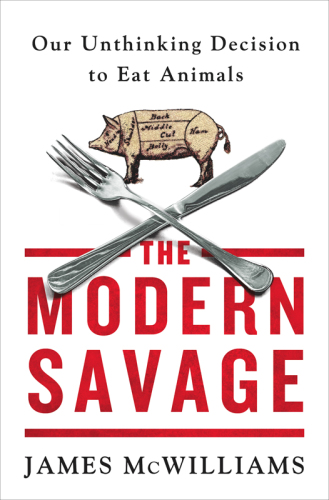
The Modern Savage
Our Unthinking Decision to Eat Animals
کتاب های مرتبط
- اطلاعات
- نقد و بررسی
- دیدگاه کاربران
نقد و بررسی

November 1, 2014
McWilliams (History/Texas State Univ.; The Pecan: A History of America's Native Nut, 2013, etc.) takes issue with the locavore movement, which preaches compassionate care of farm animals on nonindustrial farms but slaughters those animals in the end.As a vocal animal rights advocate, the author responds to recent books by Michael Pollan, Mark Bittman and Jonathan Safran Foer, introducing readers to the "omnivore's contradiction"-caring enough about animals raised for meat to offer them a more natural environment in which to live but, of course, ultimately killing them for food. He argues that the food reform movement is based "on an intellectually dishonest foundation" and notes how "[t]houghtful observation strongly suggests that animals exhibit powerful and recognizable emotional responses to a range of experiences." In several chapters, McWilliams transcribes comments and stories from online forums, blogs and posts to further his arguments, quoting others on slaughter and backyard butchery, as well as on raising chicken, beef and pork on small, nonindustrial farms. By all indications, McWilliams did not interview these farmers, and in many cases, he only identifies them by their online names. While small-scale agriculture aspires to give animals a better life, the author points out the occurrence of higher rates of disease than on nonindustrial farms. He critiques many of the claims of small-scale agriculture-e.g., that its animals are healthier, their impact is low, and they are offered a more natural environment and humane treatment. However, the author does not fully condemn small-scale agriculture; rather, he sees it as a necessary steppingstone for many people to eventually cease the eating of animals and adopt a plant-based diet. While McWilliams offers convincing arguments for animal rights, they are undermined by the extensive quotes, which become tiresome and offer little useful context.
COPYRIGHT(2014) Kirkus Reviews, ALL RIGHTS RESERVED.

November 15, 2014
McWilliams (The Politics of the Pasture) argues passionately for empathy toward animals and a radical shift in the way that Americans view eating meat. The author wastes no time laying out his argument, which is pretty straightforward: to kill and consume animals is not tolerable in the modern economy. He contends that the macroanimal slaughter system will continue to mistreat animals even if consumers attempt to buy meats conscientiously, because it will always be the cheaper option. The author is a purist, delving into the subtext of the most outspoken voices criticizing our modern relationship with food. He critiques Jonathan Safran Foer (Eating Animals) and Michael Pollan (The Omnivore's Dilemma) alike--Foer previously expressed disapproval of Pollan in Eating Animals--as well as Eric Shlosser (Fast Food Nation) for being too tepid. McWilliams stresses that animals are more sentient than we realize: "They may be even more emotionally open to us than our fellow humans, unburdened as animals are by the arts of denial and suppression." Several anecdotes of livestock owners with chickens, cows, and pigs, as well as painful descriptions of slaughtering animals, illustrate this point. VERDICT McWilliams is an expressive and persuasive writer. Unfortunately, his arguments stem predominantly from emotion, rather than reason, and do not persuade compellingly. [See Prepub Alert, 7/21/14.]--Valerie Hamra, Brooklyn
Copyright 2014 Library Journal, LLC Used with permission.

January 1, 2015
The harrowing realities of industrial farming, in which animals are processed as though they were objects instead of sentient beings, have been outed and condemned, revelations that have fostered the more humane, small-scale animal-farm movement. Now historian and agriculture writer McWilliams (The Pecan, 2013) pops the bubble of our belief that these are genuinely compassionate operations. He introduces humane livestock farmers who confess that while they do treat their animals well, they still feel that their work is unethical, especially since many transport their animals to industrial slaughterhouses. As McWilliams stringently details the disappointing and disturbing truth about small-farm operations, he tags the predicament of caring about and for animals, yet killing and eating them, the omnivore's contradiction. McWilliams doesn't deny that conscientious consumers are having a positive impact by choosing humanely produced meat, eggs, and dairy, but it's not enough. We must stop indulging in agricultural fantasies, he writes, and take our compassion for animals and concern for the environment to their logical conclusion. McWilliams' uncompromising call for plant-based food will both rile and rally readers.(Reprinted with permission of Booklist, copyright 2015, American Library Association.)

























دیدگاه کاربران